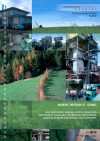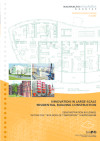Suchergebnisse
Development of a new generation of grid-connected PV inverters
Improvement of operational parameters (efficiency, quality of current waveform, reduced size and weight) and reduction of manufacturing costs
LINE-FEED - Plug-in Photovoltaic Storage for the Wall Socket
The project LINE-FEED developed technologies that are required for a photovoltaic storage system which can be installed by anybody by simply plugging it into a wall socket. The aim was to create a storage system for households in urban areas that do not have the possibility to install a photovoltaic system themselves.
Symposium: Sustainable Energy Supply for Buildings
17. May 2006 - 18. May 2006
Museum Arbeitswelt, Steyr (Austria)
Steyr, AT
The ecological potential and the socio-economic acceptance of projects for sustainable energy supply are getting more and more important for the successful implementation in buildings. The symposium will give the unique opportunity to meet international experts.
Office Building WKS - Plus Energy Office Building in Ernstbrunn
The new office building (headquarter) of Windkraft Simonsfeld AG in Ernstbrunn (Lower Austria) is planned as a plus energy building. From this excellent starting conditions it is intended to make seven more steps to explore innovative options for energy plus buildings.
Exhibition "Architecture and Passive House Standard in Austria"
The aim of the exhibition is to show the compatibility of the building quality standard "Passive House-Standard" with the requirements of the best architectural design with well-chosen examples and explanations. In this way these Austrian cultural and technical achievements shall be made more public.
NEST international - New standards for old houses international
The main goal was to raise awareness for energetic renovations of settlement houses due to the handbook "Neue Standards für alte Häuser" in Slovakia and the Czech Republic. In doing so, the refurbishment potential has been identified in the target countries, experiences exchanged and information transferred. Contacts to the relevant target groups have been established.
Conference: World Sustainable Energy Days
27. February - 1. March 2013
StadthalleWels, AT
The World Sustainable Energy Days are one of the largest annual conferences in this field in Europe, offering a unique combination of events on sustainable energy. Since more than 20 years, experts and decision makers from all over the world flock to Upper Austria to attend the events.
Model region Güssing

1/2007
Englisch, 6 Seiten
Downloads zur Publikation
Development of modular parts for clay-passive houses

Development of extensive storey-high modular parts made of renewable primary products (wood, straw, hemp) for clay-passive houses.
BIMaterial Process Design for Material Building Pass
Building Information Modelling supported compilation of a Material Building Pass; as a qualitative and quantitative documentation of the material composition of, and the material distribution within, a building structure. This project is a central milestone towards standardized, BIM-generated building material passes.
Conference: World Sustainable Energy Days
26. - 28. February 2014
Wels, AT
Annual international conference offering a unique combination of events on sustainable energy.
Conference: Smart Grids Week - Bregenz 2012
May 21st - 25th, 2012
Bregenz Festival House and illwerke vkw6900 Bregenz, AT
The Smart Grids Week - Bregenz 2012 is to contribute significantly to the development of electricity infrastructure in Austria and to continue the interconnectionprocess with international developments.
Innovation in LARGE-SCALE

Demonstration buildings within the "BUILDING OF TOMORROW" subprogram.
4/2006
Herausgeber: BMVIT
Englisch, 6 Seiten
Downloads zur Publikation
smart façade - energy potential of adaptive façade systems
A specially developed simulation model is employed to ascertain the energetic potential of adaptive façade systems. The dynamic behavior of the physical properties of the adaptive façade system reacts to both internal and external changing conditions. The goal was the development of an adaptive façade, which helps provide maximum comfort for the building occupants with minimum energy consumption.
Film "S-HOUSE - Schiestlhaus - Renaissance of Clay"

Documentary about two unique buildings
Englisch
Can sustainable building be realized at reasonable costs?
At the development "residential Passive House Utendorfgasse" were reached very low building costs. Would there be different building costs by using ecological materials and technologies? There will be calculated additional and reduced costs by using the ecological building-catalogue and internal characteristic values of projects that are similar in design.
BIGMODERN - Subproject 11: Dissemination of project results
The project is part of the flagship project BIGMODERN. It aims at disseminating all relevant results of BIGMODERN in a comprehensive and targeted way. It addresses different target groups, such as decision makers inside the BIG Bundesimmobiliengesellschaft, various users of federal buildings and other real estate companies nationally and internationally.
SOFC4City - SOFC-waste heat utilization for buildings and industry
In this project the application of a solid oxide fuel cell (SOFC) for energy supply (heat and power) of urban areas will be investigated. Due to the high temperature level of the produced heat it would be possible to use this heat for the energy supply of different heat and power consumers (residential buildings, industrial plants, etc.). One aim is to provide the SOFC-heat at several temperature levels in order to establish the advantages of the fuel cell. On the one hand the legal and market-based conditions will be evaluated, on the other hand the technological feasibility will be scoured by the use of CFD-simulation of the heat production.
Alternative insulation made from modified lignocellulosic fibers
Wood as the raw material for a new insulation material
WHISCERS. Whole House In-Situ Carbon & Emission Reduction Solution
Whiscers is a system for installing internal wall insulation with minimal mess, whilst the resident remains in the property. It involves measuring the walls in the property using a laser device that enables fast and highly accurate measurement. Information is then sent electronically to a computer controlled off-site cutting machine that is rapid, precise and mess-free.
